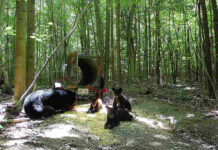PETERSBURG, Ohio – Ohio lawmakers are considering a bill that could turn the state’s raw milk laws upside down.
If passed, Senate Bill 95 and House Bill 52 would allow Ohio consumers to buy raw milk right from the farm that produced it.
“It’s a good thing because up until two weeks ago, raw milk consumption in Ohio was being done on the sly,” said Don Neeper, communications director for the Raw Milk Organization of Ohio.
Although the Ohio Department of Agriculture recently dropped its case against a Darke County dairy farmer who was providing raw milk through herd share agreements, Neeper said there are no guarantees for farmers who want to provide the product. The legislation would provide “more ammunition and more armor” for those producers, he said.
Opposed. Sen. John Boccieri, D-New Middletown, opposes the legislation because of the health concerns associated with bacteria in the milk.
“The professionals agree that the risks of unpasteurized milk can be harmful, especially relating to salmonella and E. coli bacteria,” he said during a news conference April 2 at Honey Creek Dairy Farm in Petersburg, Ohio.
Dr. John Venglarcik, director of infectious diseases services at Tod’s Children’s Hospital, said the risks of raw milk far outweigh any perceived benefits.
“There are really, literally, two handfuls of bacteria associated with unpasteurized milk,” he said.
Changes. The bills authorize licensed Grade A milk producers to sell raw milk directly to consumers under certain conditions. Both require the Ohio Department of Agriculture to adopt rules governing the production, labeling, inspection and sampling of raw milk, but specify that those rules should be only as strict as federal Grade A pasteurized milk laws.
The bills would also authorize the department to develop regulations for notices warning that raw milk has not been pasteurized and may contain organisms that cause disease.
In addition, it directs the ODA to set procedures and standards for the packaging and storage of raw milk.
Dr. Iram Ahmed, medical director of St. Elizabeth’s Mobil Medical Clinic, said milk should be pasteurized for the sake of children, whose immune systems often can’t fight the bacteria in raw milk.
“We pasteurize for a reason and that reason is the safety of our children,” she said.
Warren Byle, executive director of the Raw Milk Organization of Ohio, said the new legislation will allow raw milk consumption in a safe way. With oversight from the ODA and required testing procedures, the law will “make sure people who are selling this product are selling it in a safe way,” Byle said.
Under review. The Senate legislation was introduced March 6 by Sen. Gary Cates, R-West Chester, and it has been assigned to the Senate Agriculture Committee where testimony is ongoing.
Rep. Arlene Setzer, R-Vandalia, introduced the House legislation Feb. 20. It is being reviewed by the Agriculture and Natural Resources committee.
Gordon Withers of Honey Creek Dairy Farm said liability is the main reason he won’t sell raw milk on his Mahoning County dairy farm.
“You can’t afford to let anybody and his brother come in and buy your raw milk,” he said, citing the legal ramifications that could ensue if someone gets sick from the milk.
Herd shares. Although Boccieri opposes the outright sale of raw milk, he doesn’t see a problem with those who want to enter herd share agreements in order to get the product.
Neeper said herd shares are a good option for raw milk consumers because it allows them to develop close relationships with the farmers.
Messages left for Cates and Setzer were not returned by press time.
(Reporter Janelle Skrinjar welcomes feedback by phone at 800-837-3419, ext. 22, or by e-mail at jskrinjar@farmanddairy.com.)
Related articles:
Farmer can supply raw milk, March 29, 2007
Judge overturns raw milk verdict, January 11, 2007
Kentucky man guilty in Ohio raw milk sale (11/23/2006)
Dairy farmer can keep milking, October 12, 2006
Ohioan loses milk license October 5, 2006
Amish dairyman banned from selling raw milk again, July 7, 2006
Amish dairyman gets OK to continue farming after raw milk incident, April 27, 2006









